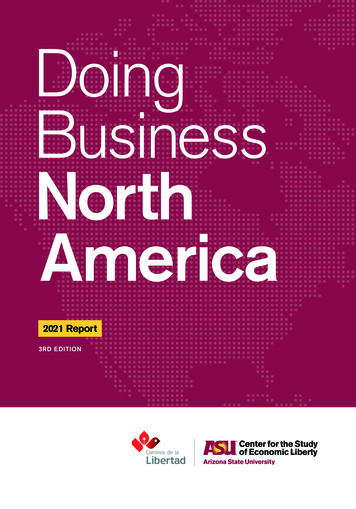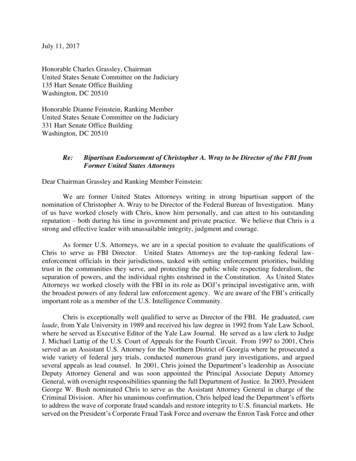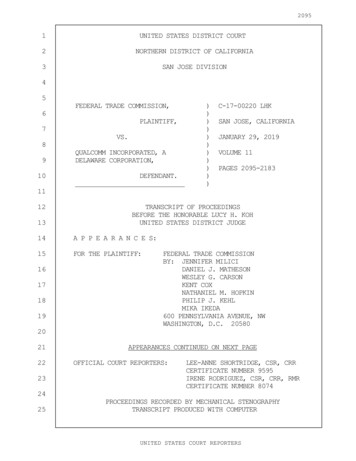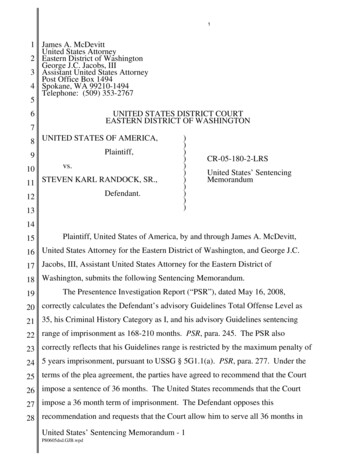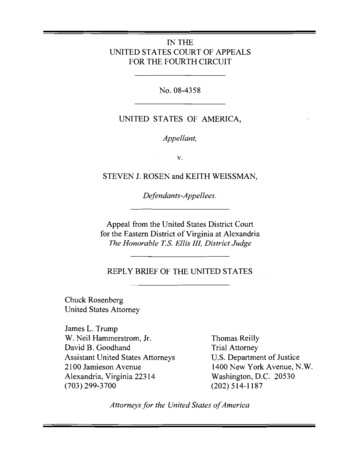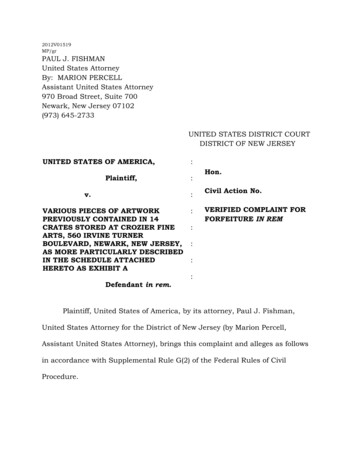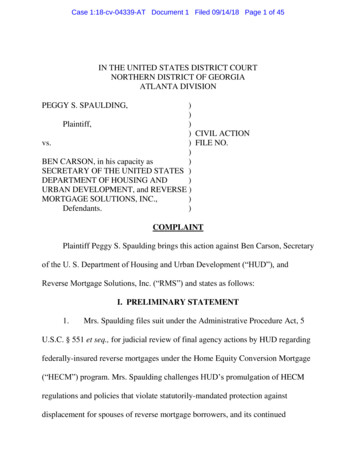
Transcription
Case 1:18-cv-04339-AT Document 1 Filed 09/14/18 Page 1 of 45IN THE UNITED STATES DISTRICT COURTNORTHERN DISTRICT OF GEORGIAATLANTA DIVISIONPEGGY S. SPAULDING,))Plaintiff,)) CIVIL ACTIONvs.) FILE NO.)BEN CARSON, in his capacity as)SECRETARY OF THE UNITED STATES )DEPARTMENT OF HOUSING AND)URBAN DEVELOPMENT, and REVERSE )MORTGAGE SOLUTIONS, INC.,)Defendants.)COMPLAINTPlaintiff Peggy S. Spaulding brings this action against Ben Carson, Secretaryof the U. S. Department of Housing and Urban Development (“HUD”), andReverse Mortgage Solutions, Inc. (“RMS”) and states as follows:I. PRELIMINARY STATEMENT1.Mrs. Spaulding files suit under the Administrative Procedure Act, 5U.S.C. § 551 et seq., for judicial review of final agency actions by HUD regardingfederally-insured reverse mortgages under the Home Equity Conversion Mortgage(“HECM”) program. Mrs. Spaulding challenges HUD’s promulgation of HECMregulations and policies that violate statutorily-mandated protection againstdisplacement for spouses of reverse mortgage borrowers, and its continued
Case 1:18-cv-04339-AT Document 1 Filed 09/14/18 Page 2 of 45enforcement of those regulation and policies that require foreclosure onwidow(er)s in violation of the HECM statute.2.Mrs. Spaulding challenges HUD’s failure to protect her, a survivingspouse of a reverse mortgage borrower, from foreclosure and displacement, asrequired by the reverse mortgage statute, 12 U.S.C. § 1715z-20(j), titled“Safeguard to Prevent Displacement of Homeowner.” As a result of HUD’s failure,Mrs. Spaulding is facing the risk of foreclosure and eviction from her home of 38years, where she expected to live for the rest of her life.3.HUD promulgated an illegal regulation that required foreclosure onnon-borrowing spouses despite the statutory mandate to protect them. After it wassued and the illegal regulation was struck down, HUD changed its illegal rule fornew loans made after August 2014, but still refused to provide protections forspouses with loans made prior to that date. Only after multiple successive courtdecisions did HUD purport to create a pathway for relief for spouses harmed by theillegal rule with HECM loans issued prior to August 2014. However, nonborrowing spouses with these earlier loans are still being foreclosed on in violationof the statute because the path to obtain this relief is overly restricted by arbitraryand capricious deadlines as well as HUD’s imposition of additional requirements2
Case 1:18-cv-04339-AT Document 1 Filed 09/14/18 Page 3 of 45not in its written policy. The Court should protect Mrs. Spaulding and the lender inthis case from the harms created by HUD’s illegal policies.4.Mrs. Spaulding seeks a declaration that HUD’s regulations andpolicies violate the HECM statute. Mrs. Spaulding further seeks a declaration thatbecause the regulation is invalid as applied to the Spaulding loan, the foreclosureprovisions of the regulations have not been triggered, that RMS is not required toforeclose, and that HUD may not penalize RMS for not foreclosing (on the solebasis of Mr. Spaulding’s death) and displacing Mrs. Spaulding from her home.5.Mrs. Spaulding also seeks a declaration that the Spaulding loan meetsthe criteria for assignment to HUD pursuant to the guidelines for the MortgageeOptional Election (“MOE”) set forth in Mortgagee Letter 2015-15, that HUD’srejection of the MOE assignment in her case was arbitrary, capricious, and not inaccordance with the law, and that the deadlines set forth in Mortgagee Letter 201515 and HUD’s enforcement thereof are arbitrary, capricious, and not in accordancewith the HECM statute.6.Mrs. Spaulding seeks a declaration that due and payable status of theloan remains in a deferral period under the terms of Mortgagee Letter 2015-15.3
Case 1:18-cv-04339-AT Document 1 Filed 09/14/18 Page 4 of 457.Mrs. Spaulding further seeks reformation of the mortgage to includethe provision protecting her from displacement, as required by the tripartite HECMinsurance agreement with which the parties intended to comply.8.Mrs. Spaulding seeks a preliminary injunction preventing HUD frompenalizing RMS for deferring any initiation of foreclosure during the pendency ofthis action.II. THE PARTIES9.Plaintiff Peggy S. Spaulding is an 85-year-old widow who wasmarried to her husband, Henry L. Spaulding, for fifty-seven (57) years. In 1980,Mr. and Mrs. Spaulding purchased their home at 5412 Hugh Howell Road in StoneMountain, DeKalb County, Georgia, and Mrs. Spaulding has lived therecontinuously since that time. Mrs. Spaulding is currently facing the risk of nonjudicial foreclosure sale of her home of thirty-eight (38) years as a result of HUD’sfailure to protect surviving spouses as required by statute.10.Defendant Ben Carson is the Secretary of the Department of Housingand Urban Development, a cabinet-level federal agency. HUD’s headquarters islocated at 451 7th Street S.W., Washington, D.C., 20410.11.Defendant Reverse Mortgage Solutions, Inc. is a Delawarecorporation with its principal office in Texas. RMS regularly engages in the4
Case 1:18-cv-04339-AT Document 1 Filed 09/14/18 Page 5 of 45business of purchasing and servicing reverse mortgage loans in the State ofGeorgia. RMS is the assignee and holder of the HECM mortgage loan securingMrs. Spaulding’s homeplace property. RMS is also the servicer of the Spauldingloan. RMS may be served on its registered agent for service of process, C TCorporation System, 289 S Culver St, Lawrenceville, GA, 30046-4805.III. JURISDICTION AND VENUE12.This Court has subject matter jurisdiction under 28 U.S.C. § 1331,under 5 U.S.C. § 702 for the APA claims, under 28 U.S.C. § 1346(a)(2) for thereformation claim against HUD, and under 28 U.S. Code § 1367 to the extent thatany claims against RMS are determined not to fall under this Court’s subjectmatter jurisdiction.13.Venue is proper in this Court under 28 U.S.C. § 1391(e).IV. FACTUAL BACKGROUNDA. The HECM Program14.HUD’s duty to protect Mrs. Spaulding from foreclosure anddisplacement is rooted in a federal program to insure reverse mortgages called theHome Equity Conversion Mortgage (“HECM”) program. The HECM program wasoriginally authorized by the Housing and Community Development Act of 1987,Pub. L. No. 100-242, 101 Stat. 1815 (1988); 12 U.S.C. § 1715z-20. Under the5
Case 1:18-cv-04339-AT Document 1 Filed 09/14/18 Page 6 of 45program, the United States Government insures reverse mortgages originated byprivate lenders.15.A reverse mortgage is a loan that allows older homeowners to convertpart of the equity in their homes into cash. It is the “reverse” of a traditionalmortgage, in which the borrower repays the borrowed sum on a monthly basis;instead, reverse mortgage borrowers are not required to make monthly or otherperiodic payments to repay the loan. The loan balance increases over time, and theloan does not become due and payable until one of a number of defined triggeringevents occurs. 12 U.S.C. § 1715z-20(j).16.The HECM program was enacted by Congress in 1988 “to meet thespecial needs of elderly homeowners by reducing the effect of the economichardship caused by the increasing costs of meeting health, housing and subsistenceneeds at a time of reduced income.” 12 U.S.C. § 1715z-20(a).17.The HECM program meets this primary purpose by allowing olderhomeowners to access their home equity without risking foreclosure, eviction, andhomelessness. The statute recognizes that in order to preserve the housing of oldermarried homeowners who use the HECM program, it is imperative that bothspouses be safe and secure in their home while either of them is still living there,6
Case 1:18-cv-04339-AT Document 1 Filed 09/14/18 Page 7 of 45regardless of whether both spouses appear as borrowers on the loan documents. 12U.S.C. § 1715z-20(j) (“Subsection (j)”).18.HUD administers the HECM program and issues its governingregulations. HUD further governs the HECM program through the HUDHandbook, 4235.1 REV-1 Home Equity Conversion Mortgages (1994), in a seriesof “mortgagee letters” directed to private lenders participating in the program, andin its online “HECM Servicing Frequently Asked Questions.”19.The HECM statute states that the loan becomes “due and payable”upon the death of the homeowner(s) (defined to include any non-borrowingspouse), sale of the property, or other events to be determined by HUD. 12 U.S.C.§ 1715z-20(j).20.Any lender intending to participate in the HECM program for aparticular loan must extend the loan in compliance with the HECM statute andHUD’s regulations. If approved, HUD issues an insurance certificate for the loan.An initial mortgage insurance premium is paid from the funds at closing, andongoing monthly premiums are added to the balance of the loan securing theborrower’s residence.21.No written binder or separate document sets forth the terms of theHECM insurance. Instead, the “contract of insurance” is defined as “the agreement7
Case 1:18-cv-04339-AT Document 1 Filed 09/14/18 Page 8 of 45evidenced by the issuance of a Mortgage Insurance Certificate or by theendorsement of the Commissioner upon the credit instrument given in connectionwith an insured mortgage, incorporating by reference the regulations in thissubpart and the applicable provisions of the Act." 24 CFR 203.251 (j) (emphasisadded).22.HECM insurance provides a number of benefits to the borrowers whopay for it, as well as benefits to their heirs. It provides protections for borrowers ifthe lender defaults on its obligations under the mortgage, see 24 C.F.R. §§206.117, 206.121, and ensures that neither borrowers nor their heirs will face adeficiency in the event that the balance of the reverse mortgage grows to exceedthe value of the home. 24 C.F.R. §§ 206.123(b); 206.125(c).23.HUD’s issuance of an insurance certificate for a particular loan “shallbe conclusive evidence of the eligibility of the loan or mortgage for insurance.” 12U.S. Code § 1709 (e).B. HUD Has Failed to Protect Spouses from Displacement24.The federal reverse mortgage statute, reflecting the will and intent ofCongress in passing the law, demonstrates significant concern for the welfare ofelderly homeowners and their spouses. It includes a section titled “Safeguard toprevent displacement of homeowner,” which states that HUD “may not insure a8
Case 1:18-cv-04339-AT Document 1 Filed 09/14/18 Page 9 of 45home equity conversion mortgage under this section unless such mortgageprovides that the homeowner’s obligation to satisfy the loan obligation is deferreduntil the homeowner's death, the sale of the home, or the occurrence of otherevents specified in regulations of the Secretary.” 12 U.S.C. § 1715z-20(j). Thisprovision further states that “[f]or purposes of this subsection, the term‘homeowner’ includes the spouse of a homeowner.” Thus the loan may not becomedue and payable until the death of both the homeowner and the homeowner’sspouse, regardless of whether the spouse is named on the mortgage.25.The legislative history behind the bill enacting the HECM programconfirms the plain meaning of this provision. The Senate Report on the legislationstates that HECM mortgages shall “defer[ ] any repayment obligation until death ofthe homeowner and the homeowner’s spouse . . .” (emphasis added).126.For many years, HUD had never fully implemented the plain meaningof this mandate. Instead, its regulations substituted the term “mortgagor” for“homeowner” and “spouse,” and stated that the duty to satisfy the mortgage occurswhen the “mortgagor dies and the property is not the principal residence of at leastone surviving mortgagor. . . ” 24 C.F.R. § 206.27(c) (emphasis added). HUD1Report 100-21 by the Senate Committee on Banking, Housing and Urban Affairsaccompanying S. 825, 100th Congress, Section 135 (reporting on Subsection254(j)).9
Case 1:18-cv-04339-AT Document 1 Filed 09/14/18 Page 10 of 45defines mortgagor as “each original borrower under a mortgage. The term does notinclude successors or assigns of a borrower.” 24 C.F.R. § 206.3. Thus HUD’sregulations did nothing to protect widows or widowers, in violation of the statute.27.HUD’s mortgage documents further eroded the statutory protectionthat Congress enacted. The “Standard Mortgage,” which HUD wrote and requiredto be used in all HECM transactions until August 4, 2014, made the mortgage dueand payable upon the death of the borrower, regardless of whether a nonborrowing spouse survives the borrower.28.HUD’s substitution of the term “mortgagor” for “homeowner,” and itsadoption of a definition of “mortgagor” that is contrary to and more limited thanthe HECM’s statutory definition of “mortgagor,” makes the HECM “due andpayable” upon the death of the borrowing spouse. Thus, the regulation violated thekey statutory protection for a surviving spouse who is not named on the HECM. 12U.S.C. § 1715z-20(j).29.The U.S. District Court for the District of Columbia and the U.S.District Court for the Northern District of Georgia have both ruled that HUD’sregulation at 24 C.F.R. § 206.27(c)(1) (requiring the loan to come due upon thedeath of the “mortgagor”) violated the plain language of the HECM statute and isinvalid. Bennett v. Donovan, Case No. 11-498, 2013 U.S. Dist. LEXIS 140440,10
Case 1:18-cv-04339-AT Document 1 Filed 09/14/18 Page 11 of 45*17 (D.D.C. Sept. 30, 2013) held: “Subsection (j) means what it says: the loanobligation is deferred until the homeowner’s and the spouse’s death. Therefore, thejudicial inquiry stops there.” See also, Harris v. Castro, 1:14-CV-3110-TCB, 2015WL 13547618, at *8 (N.D. Ga. Nov. 19, 2015).30.After the 2013 Bennett ruling, HUD changed its policy, effectiveAugust 4, 2014, so that new reverse mortgage loans would comply with the statuteand protect future non-borrowing spouses from foreclosure and displacement.Pursuant to Mortgagee Letter 2014-07, new loans issued after the effective datewere required to provide a deferral period on the due and payable status of the loanafter the borrower’s death for an eligible non-borrowing spouse identified in theloan documents at the time of closing. In order to remain eligible for this deferralperiod, the spouse must obtain legal ownership or other ongoing legal right toremain in the property within 90 days of the borrower’s death, ensure that allobligations of the borrower remain satisfied (i.e. payment of property taxes andhomeowner’s insurance), and ensure that the loan does not become due andpayable for any reason other than the borrower’s death.31.For HECMs originated prior to August 4, 2014, non-borrowingsurviving spouses have continued to face foreclosure and displacement due toHUD’s failure to comply with the law it was charged with implementing.11
Case 1:18-cv-04339-AT Document 1 Filed 09/14/18 Page 12 of 4532.Six non-borrowing surviving spouse plaintiffs were parties to twolawsuits filed against HUD by AARP: Bennett, Id., and Plunkett v. Donovan,D.D.C. Case No. 14-cv-326. As a result of the Bennett ruling striking downSection § 206.27(c)(1) as invalid, HUD recognized the “automatic” result that thedeath of the borrower spouse is not a trigger for the foreclosure provisions in 24C.F.R. § 206.125. HUD notified the mortgagees of the six plaintiffs that noforeclosure was required as a result of the borrower’s death, since HUD’sregulation was ruled invalid.33.However, HUD failed to extend this principle beyond those sixindividual plaintiffs. The Plunkett court held that it was arbitrary and capricious forHUD to differentiate the six plaintiffs from other surviving spouses in theapplication of this “automatic” relief, and remanded to HUD. Plunkett v. Castro,67 F. Supp. 3d 1, 22 (D.D.C. 2014).34.In Harris v. Castro, a Georgia non-borrowing spouse of a reversemortgage borrower brought suit against HUD, challenging the regulation thatrequired foreclosure and displacement from her long-time home following thedeath of her husband. The Northern District of Georgia agreed with the Bennettand Plunkett decisions, and recognized that Section § 206.27(c)(1) was invalid asapplied to the Harris loan. Accordingly, the Court held that Mr. Harris’s death did12
Case 1:18-cv-04339-AT Document 1 Filed 09/14/18 Page 13 of 45not trigger the HUD regulations that would require the loan to be called due andpayable, and there was no basis for HUD to require foreclosure under itsregulations. Harris v. Castro, 1:14-CV-3110-TCB, 2015 WL 13547618, at *8(N.D. Ga. Nov. 19, 2015) (“The Court has already found that HUD's regulation isinvalid, and HUD does not dispute that as a result, George Harris's death did nottrigger the foreclosure provisions in HUD's regulations and Harris's loandocuments. The Court concludes that Harris is entitled to an enforceable judgmentmemorializing these findings and recognizing her right to remain free fromdisplacement so long as no other event of default occurs. . . . The Court herebydeclares 24 C.F.R. § 206.27(c)(1) invalid as applied to Harris and holds thatGeorge Harris's death was not a triggering event for purposes of HUD's HECMregulations and the Harris loan documents incorporating language from thoseregulations.”) The Court further held that HUD had not amended the invalidregulation, and that its provision of other relief in Mortgagee Letter 2015-15 didnot moot the plaintiff’s claims concerning the validity of the regulation. Id. at *5,7–8.35.Eventually, more than three years after the Bennett ruling declaringthe regulation to be invalid, HUD amended 24 C.F.R. § 206.27(c) effectiveSeptember 19, 2017 to provide a deferral period on foreclosure for an eligible non13
Case 1:18-cv-04339-AT Document 1 Filed 09/14/18 Page 14 of 45borrowing spouse. However, this deferral period only applies to loans originatedon August 4, 2014 or after, where the non-borrowing spouse is specifically namedin the loan documents and contractually entitled to receive the deferral protectionfrom foreclosure. The amended regulation did not incorporate any deferral periodfor non-borrowing spouses with loans issued prior to August 4, 2014, where nodeferral period was expressly provided in the loan documents.36.Accordingly, for loans originated prior to August 4, 2014, theregulation is still in violation of the HECM statute and is invalid, as it continues torequire the loan to be called due and payable upon the borrower’s death, regardlessof whether a non-borrowing spouse still resides in the home.C. The Mortgagee Optional Election Assignment Program37.On June 12, 2015, nearly two years after the Bennett ruling and almosta year after the Plunkett remand, HUD issued Mortgagee Letter 2015-15, whichcreated an alternative to foreclosure for mortgagees of reverse mortgage loansoriginated prior to August 4, 2014 where the home is occupied by a non-borrowingspouse. That option is the Mortgagee Optional Election (“MOE”), whichpurportedly allows the mortgagee to assign the loan to HUD, so that HUD canallow the spouse to continue living in the home for his or her lifetime.14
Case 1:18-cv-04339-AT Document 1 Filed 09/14/18 Page 15 of 4538.In order to qualify for the MOE assignment, the non-borrowingspouse must satisfy a number of substantive criteria, including requirements thatthe non-borrowing spouse: (1) was legally married to the borrower at the time theHECM was originated; (2) currently resides and resided at the property securingthe HECM as his or her principal residence at origination and throughout theborrower’s life; and (3) must have or be able to obtain, within 90 days of theborrower’s death, good, marketable title to the property or a legal right to remain inthe property for life. In addition, in order to be eligible for assignment, the loanmust not be eligible to be called due and payable for any reason other than theborrower’s death.39.HUD imposed arbitrarily tight deadlines for the mortgagee to electand initiate the assignment. First, if the mortgagee elects to pursue the MOEassignment option, it must notify HUD that it is making such election within 120days of the borrower’s death (referred to herein as the “election deadline”).Second, within 60 days of making the election, the mortgagee must review andcertify to HUD that the non-borrowing spouse is eligible under all MOE criteria.Third, within 120 days of making the election, the mortgagee must initiate theassignment to HUD (referred to herein as the “assignment initiation deadline”).15
Case 1:18-cv-04339-AT Document 1 Filed 09/14/18 Page 16 of 4540.HUD made the MOE assignment optional for the mortgagees, as analternative to pursuing foreclosure. On information and belief, all mortgagees(including RMS) would prefer to assign loans to HUD rather than foreclose on awidow or widower whenever possible. Mortgagees do not want the negative publicperception created by foreclosing on a grieving spouse and also do not want tocause unnecessary suffering if their financial interests are protected in some otherway. Mortgagees are electing to participate in the MOE program and areendeavoring to comply with the MOE requirements in order to assign loans toHUD whenever possible.41.On information and belief, based on conversations with mortgageesand their counsel, mortgagees have had difficulty successfully assigning many ofthe loans that they have determined would be eligible under the MOE criteria, andHUD has arbitrarily denied MOE assignments.42.According to HUD’s January 2018 response to a request forinformation under the Freedom of Information Act, HUD had only acceptedapproximately half of the loans submitted for assignment.22FOIA 17-FI-HQ-00484; Press Release, California Reinvestment Coalition(March 12, 2018), -after-death-of-spouse.16
Case 1:18-cv-04339-AT Document 1 Filed 09/14/18 Page 17 of 4543.Many loans are being denied for MOE assignment due to the shortdeadline of 120 days from the borrower’s death for the mortgagee to make theMOE assignment election to HUD. There is often a significant delay in themortgagee learning of the borrower’s death, which makes this deadlineimpracticable. Non-borrowing spouses, already struggling with the death of theirspouse, are often unaware that the reverse mortgage will come due, or that there isan MOE assignment option for surviving spouses about which they need to startcommunicating. HUD has not notified, or suggested or required that mortgageesnotify, reverse mortgage borrowers (and their spouses) of the MOE program priorto the borrower’s death. Thus, non-borrowing spouses frequently do notunderstand the need or importance of notifying the mortgagee of the borrower’sdeath in order to initiate the MOE assignment process.44.According to HUD’s January 2018 FOIA response, missing the 120-day election deadline was the top reason HUD denied the later submission of theloan for assignment.45.Even after the mortgagee has made the election, determined the non-borrowing spouse to be eligible under the MOE criteria, and initiated assignment toHUD within the deadlines proscribed, HUD has routinely denied assignment for17
Case 1:18-cv-04339-AT Document 1 Filed 09/14/18 Page 18 of 45additional reasons that are not set forth in the MOE criteria of ML 2015-15.3HUD’s denials frequently state that the mortgagee can correct the issues andresubmit the loan for assignment. However, once the mortgagee does so, HUDthen denies the assignment for being past the assignment initiation deadline (120days following the date the MOE election was made). This is true irrespective ofthe fact that the assignment was initiated within the applicable deadline, and thedenial was for reasons other than those listed in the MOE criteria. It was thisprecise HUD policy that prevented Ms. Spaulding’s loan from being assigned, asdescribed more fully below.46.HUD has indicated that it will not allow waivers or extensions of theelection deadline or assignment initiation deadline under any circumstances. Sucha waivers are specifically authorized by 24 C.F.R. § 5.110. Indeed, in a priorversion of the MOE assignment program, HUD provided that mortgagees couldrequest waiver of the deadlines.4 On information and belief, based onconversations with mortgagees and their counsel, mortgagees anticipated that HUDwould permit waivers or extensions of the MOE deadlines, because HUD regularly3In its January 2018 FOIA response, HUD stated that the second most commonreason for denial of MOE assignment was that the “Loan Balance and NetPrincipal Limit did not meet FHA’s tolerance level.” This stated denial reason doesnot relate to any requirements provided in ML 2015-15.4Dept. Housing and Urban Dev’t, Mortgagee Letter 2015-03 (Jan. 29, 2015).18
Case 1:18-cv-04339-AT Document 1 Filed 09/14/18 Page 19 of 45allowed extensions of deadlines in other aspects of the HECM program. However,once mortgagees began the process of submitting loans for assignment under theMOE program, they discovered that HUD would provide no such flexibility forloans that otherwise met all substantive criteria for MOE assignment. Instead, ifthese deadlines are missed, even for good cause, HUD policies and regulationsrequire the mortgagee to foreclose on the non-borrowing spouse.47.Thus, although the MOE assignment program purports to provide analternative to foreclosure that would protect the non-borrowing spouse fromdisplacement, HUD’s practices and policies in the enforcement of this programhave made this alternative untenable for many eligible non-borrowing spouses andmortgagees that want to assign the loan to HUD.48.The deadlines imposed by ML 2015-15 put non-borrowing spouses ofHECMs originated prior to August 4, 2014 at substantially-greater risk offoreclosure and displacement compared with non-borrowing spouses of HECMsoriginated on or after that date. ML 2014-03, and now the amended regulation 24C.F.R. § 206.27(c), recognize a deferral period on the due and payable status of theloan for an eligible non-borrowing spouse named in the mortgage documents(originated on or after August 4, 2014) who meets the same substantive criteria asthose required for the MOE. Unlike the MOE requirements, however, there are no19
Case 1:18-cv-04339-AT Document 1 Filed 09/14/18 Page 20 of 45similar deadlines for action that the mortgagee must meet in order for the nonborrowing spouse to obtain the deferral period. These non-borrowing spouses withpost-August 4, 2014 HECMs have the opportunity to be identified at the outset,such that the deferral period after the borrower spouse’s death is essentiallyautomatic. HUD could have provided a similar process for non-borrowing spousesof pre-August 4, 2014 to be identified and pre-qualified for the MOE prior theborrower spouse’s death. But instead, ML 2015-15 imposes strict and unwaveringdeadlines the grieving spouse must meet in order to be protected from foreclosureand displacement.49.HUD’s continuing failure to comply with the law has had tragicconsequences for spouses of reverse mortgage borrowers, like Mrs. Spaulding,who unexpectedly face a demand to satisfy the mortgage in full soon after losingtheir spouses. Those homeowners who cannot pay the often-immense demand facethe threat of foreclosure and eviction – piling the tragedy of displacement orhomelessness on top of the loss of a husband or wife.D. The HECM Statute Requires HUD to Actto Protect Spouses from Displacement50.HUD’s regulations and its creation and imposition of the “StandardMortgage” violated a core purpose of the HECM program: protecting survivingspouses from displacement.20
Case 1:18-cv-04339-AT Document 1 Filed 09/14/18 Page 21 of 4551.HUD violated the reverse mortgage statute by failing to exercise itspowers to preserve the homeownership of surviving spouses whose partnersreceived reverse mortgages. When a reverse mortgage loan comes due and payabledue to the death of a HECM borrower, the HECM borrower’s spouse is entitled toprotection from displacement even if he or she is not a named borrower on themortgage. HUD has both the statutory power and the obligation to protect thesespouses from displacement. 12 U.S.C. § 1715z-20(j).52.Subsection (i) of the reverse mortgage statute states that in order tofurther the purposes of the reverse mortgage program, HUD must take any actionnecessary to provide reverse mortgage borrowers and lenders with any funds theyare entitled to under the reverse mortgage contracts. 12 U.S.C. § 1715z-20(i)(1).Such actions may include, but are not limited to, paying funds from the FHAinsurance fund and accepting assignment of the mortgage. 12 U.S.C. § 1715z20(i)(2).53.Although HUD has purported to create the MOE program to acceptassignment of these mortgages, in reality, the deadlines imposed in MortgageeLetter 2015-15 and HUD’s manner of implementing the program to date havemade this program impossible to access for roughly half of the eligible nonborrowing spouses for whom mortgagees have attempted to assign the loan. This is21
Case 1:18-cv-04339-AT Document 1 Filed 09/14/18 Page 22 of 45in addition to the many non-borrowing spouses for whom the servicer neverattempted to make the assignment due to HUD’s arbitrary and capricious deadlinesand implementation rules.54.The deadlines imposed by HUD in Mortgagee Letter 2015-15, andHUD’s practice of denying assignments for eligible spouses, are not in accordancewith the HECM statute’s unqualified requirement that the non-borrowing spousebe protected from displacement.55.HUD has (and had) the power to prevent foreclosures of the homes ofwidows and widowers. HUD controls every aspect of the HECM reverse mortgageprogram. Congress gave HUD broad statutory powers to protect homeowners andlenders and to ensure the goals of the program are met. 12 U.S.C. § 1715z-20(i).HUD has abdicated its responsibility to protect surviving spouses fromdisplacement, and worked crosswise against the statute it was entrusted withimplementing, through its contin
HUD administers the HECM program and issues its governing regulations. HUD further governs the HECM program through the HUD Handbook, 4235.1 REV-1 Home Equity Conversion Mortgages (1994), in a series of "mortgagee letters" directed to private lenders participating in the program, and in its online "HECM Servicing Frequently Asked .




